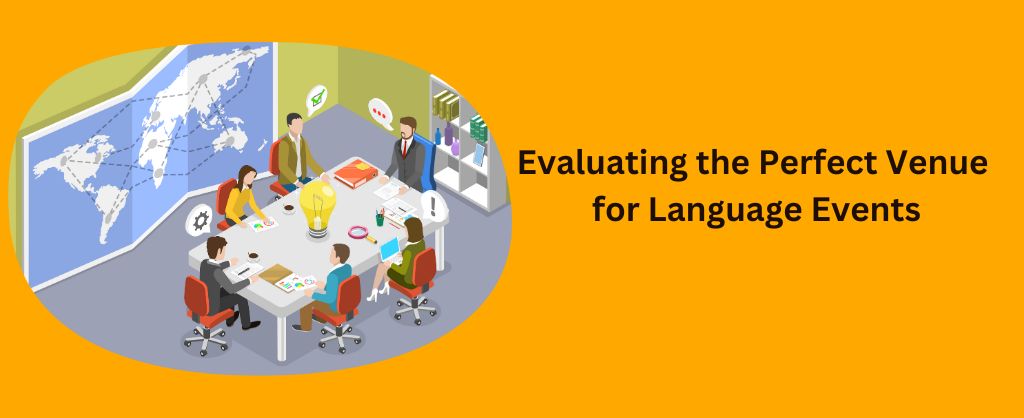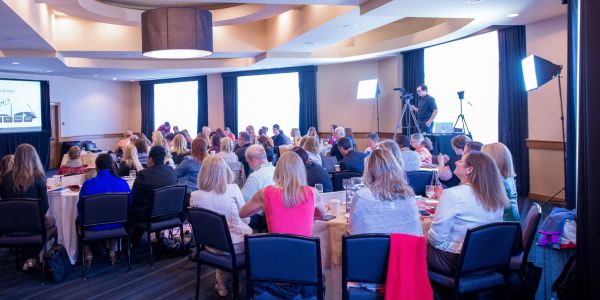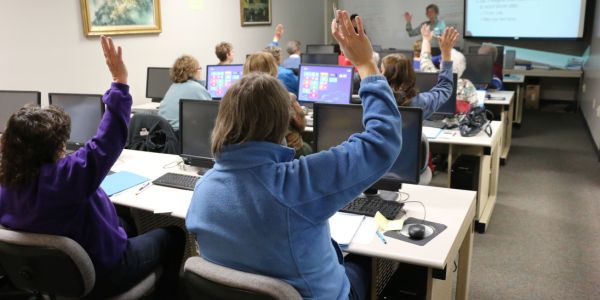How to Choose the Optimal Venue for Language Events

Selecting the perfect venue is one of the most important parts of planning any event. The venue sets the tone and provides the backdrop for your event.
Venue Selection Guide for Language Events
When organizing a language-related event like a conference, meetup, or workshop, the venue choice is especially critical.
You’ll want to find a space that aligns with the goals and audience for your specific event. The ideal venue will enhance the content and conversations you hope to facilitate.
With so many factors to weigh, picking the right venue for your language event can feel daunting. This article will walk you through what to consider when evaluating venues for different types of language gatherings.
Conference Venues
Academic and professional conferences bring together speakers and attendees around a specific language or linguistic topic. Popular conference themes include teaching languages, translation, computational linguistics, or a specific language like Spanish or Mandarin.
When selecting a conference venue, you’ll need to accommodate large groups, breakout sessions, catering, A/V capabilities, and potentially lodging. As you research options, keep the following factors in mind:
Location & Accessibility
Conferences tend to draw attendees from wide geographic areas, so priority #1 is finding a location that’s convenient for the bulk of your expected participants. Is the city you’re considering easy to get to via plane, train, or car? Is the venue in an area with plenty of lodging options? Can attendees get around easily without a car?
Once you’ve settled on a general area, look for venue spaces near public transit hubs, airports, or centrally within downtown areas. This makes it easy for attendees to get to sessions and events.
Capacity
Carefully estimate your expected attendees and make sure prospective venues can accommodate that size crowd. Will you need one large ballroom or several breakout rooms? Is there adequate space for exhibitor booths and poster sessions?
Don’t forget to account for growth if this is an annual conference. Leave room for 10-20% more participants than your current projections.
A/V Capabilities
Presenters will need microphone and projector access for presentations. Make sure the venue can provide reliable A/V equipment and on-site tech support. Attention to sound, lighting, and layout is key for a comfortable conference experience.
Catering & Dining
Food and beverage service is a big part of any conference. Evaluate what’s included with the venue rental and whether their catering meets your needs. Can they provide coffee breaks, breakfasts, lunches, receptions, and/or dinners? Are there restaurants or external caterers approved for the venue?
Affordability
Conference budgets can vary widely, so have your finances in order before contacting venues. Hotels and convention centers give discounts for booking multiple days, so pricing is rarely per-day. Expect venue rental, A/V, catering, service charges, and taxes to add up quickly.
Prioritize necessity over luxury to control costs. For example, opt for simple buffet meals over plated dinners.
Lodging Partnerships
If attendees will need overnight accommodations, look for venue packages that include special room blocks and discounts at nearby hotels. This streamlines booking for out-of-town participants.
Conference Experience
It’s hard to quantify, but some venues just have a great conference “feel” while others feel sterile. Look for character, comfort, and flow in venue spaces. Are the meeting rooms inviting and energizing? Can attendees easily navigate and mingle? Don’t underestimate the impact of venue “vibe” on the event experience.
Language Center or School Venues
If you’re organizing a language teacher training, meetup for translators, or other professional development event, a language school or center can provide an ideal venue.
Benefits of using language centers include classroom space, equipment, staff assistance, and built-in amenities. Often cheaper than hotels and convention centers, these facilities give your event an academically-focused feel.
Here are key considerations when evaluating a language school venue:
Classroom Setup
Do they have flexible classroom space for meetings, presentations, group work, and receptions? Make sure rooms have movable seating, tables, projectors, and whiteboards available.
Size
Depending on the school, capacity may be smaller than a traditional convention center. Make sure they can comfortably accommodate your expected head count before booking.
Technology Access
Find out what’s included equipment-wise and policies around WiFi, photocopying, tech support, etc. Are laptops, headphones, and other tools available for rent?
Catering Options
Some schools offer catering packages through their cafeteria. If not, find out if they allow outside food and if there are nearby restaurants that cater affordably.
Scheduling
Events will likely take place outside normal school hours and schedules. Make sure the facility coordinates calendars so your event doesn’t conflict with classes or other activities.
Staffing Support
Events often require extra staff for setup, registration, A/V assistance, and troubleshooting. Clarify if school employees can provide that support or if you’ll need to hire additional labor.
Ambiance
What’s the environment like? Schools with lots of student work, global décor, and comfortable lounge spaces intrinsically support language events. Make sure the vibe aligns with your goals.
Community or Municipal Venues
For smaller regional gatherings, community centers, libraries, museums, or municipal meeting facilities may fit the bill. Benefits include convenience, affordability, and local flair.
Here are some things to look for with these civic venue spaces:
Central Location
Community venues are all about convenience, so find something central to your expected audience. Is it easily accessible by car or public transportation?
Parking
Free, plentiful parking is key. Make sure spaces are ADA compliant as well.
Capacity
Community rooms book up fast. Reserve your date well in advance and get a firm count on room capacity before promoting.
Rental Costs
Government and non-profit run facilities are very budget-friendly. Be sure to clarify what’s included (tables, chairs, equipment, etc.) and any extra fees.
Hours
Municipal buildings typically close by 5 or 6pm. If you need an evening event, confirm they can accommodate that.
Tech Access
Don’t expect elaborate A/V, but basics like WiFi, projectors, and speakers should be available. Clarify tech support options in case anything doesn’t work.
Food & Drink
Most don’t allow food or require use of in-house catering. Check permit policies if you want to bring in external vendors.
Ambiance
Community venues can feel very utilitarian. Consider decorations, signage, and branding to give your event some flair.
Unique Venues
Sometimes generic hotels and standard meeting rooms feel dull. If you want something fresh and memorable for your language event, get creative with your venue search.
Unique gathering spots like museums, cultural centers, performance spaces, outdoor areas, and non-traditional businesses can be great event venues.
Relevance
Choose something relevant to the event theme or location. For example, an art museum for creative writing or the botanical gardens for a linguistics conference.
Engagement
Interactive spaces get people engaged. Science museums, hands-on galleries, gardens, and historical sites all work well.
Inspiration
Venues that spark new perspectives are ideal for conferences and creative workshops. Try theaters, design studios, or beautiful natural settings.
Culture
For language and international events, pick venues that tie into regional or ethnic cultures. Chinatown markets, Little Italy restaurants, Hispanic social clubs.
Logistics
Unusual venues typically require more planning for parking, permits, rentals, insurance, etc. Budget extra time and resources.
Ambiance
Ultimately, choose somewhere attendees will rave about even years later. Find venues with personality, beauty, exclusivity, or regional flair.
Virtual Venues
During the coronavirus pandemic, many language events went virtual out of safety necessity. But even now, hybrid conferences, online meetups, and webinars remain popular options.
Choosing the right platform is key for successful virtual events. Here’s what to look for:
Video Capacity
Make sure the software or tools you use can handle the number of attendees you expect. Test capacity limits.
Audio Quality
Clear audio is critical, especially for language-focused events. Prioritize platforms with reliable sound and microphone features.
Viewing Options
Allow attendees to toggle speaker view, gallery view, screen share, and virtual background options.
Engagement Features
Chat boxes, polls, Q&As, whiteboards, and breakout rooms keep people focused and participating.
Ease of Use
Pick intuitive platforms that don’t require extensive training or tech skills. Attendees will range in virtual proficiency.
Technical Support
Make sure experienced moderators and IT support can troubleshoot issues and assist presenters as needed.
Pricing
Virtual venue costs are based on factors like usage time, number of hosts/attendees, and platform capabilities. Create a budget before comparing options.
Key Takeaways
Selecting the right venue sets the stage for event success. Keep these tips in mind as you evaluate options:
- Make sure the location works for your attendees and your budget. Convenience and affordability are key.
- Match capacity, amenities, and ambiance to your event purpose and target audience.
- Prioritize critical needs like presentation capabilities over nice-to-haves.
- Allow plenty of time for venue research, reservations, and planning.
- Get creative! Consider schools, community centers, cultural sites, or virtual platforms.
- Walk the space in advance to identify potential issues or opportunities
By putting in the venue research legwork early, you’ll find the perfect backdrop for meaningful conversations, engaging content, and impactful connections at your next language event.













